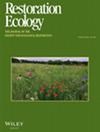使用不同的种子恢复方法恢复海草 Posidonia australis 和 P. sinuosa 的早期幼苗发育和存活率
IF 2.7
3区 环境科学与生态学
Q2 ECOLOGY
引用次数: 0
摘要
世界上已有多个地方开展了以海草种子为基础的恢复工作,但事实证明,在幼苗招募的脆弱初始阶段的干扰是成功恢复的主要瓶颈。详细调查海草幼苗最初阶段的存活和生长情况,对开发改善幼苗建立和存活的技术具有重要贡献。在此,我们调查了 Posidonia australis 和 P. sinuosa 的早期幼苗发育情况,并量化了不同种子修复方法下幼苗存活和发育的变化。果实开裂后的第一个月,在室内水族箱中记录了幼苗的早期发育情况。在第二个异地实验中,我们确定了三种不同的恢复方法(表面播种、幼苗种植和在麻袋内种植)对幼苗头两个月存活和发育的影响。在第一个实验中,7 天后就长出了带有第一根根毛的主根。1 个月后,根长达 20-60 毫米,使幼苗牢固地扎根于沉积物中。与表面播种相比,幼苗种植和麻袋恢复处理对 P. australis 的存活率没有显著影响,但增加了 P. sinuosa 的幼苗死亡率,尽管其生长速度更快(芽和根的长度分别长了约 50% 和 40%)。这些水族箱规模的实验表明,种植方法可以提高某些物种的幼苗成活率,促进受损海草栖息地的恢复。本文章由计算机程序翻译,如有差异,请以英文原文为准。
Early seedling development and survival of seagrasses Posidonia australis and P. sinuosa using different seed‐based restoration methods
Seagrass seed‐based restoration has been developed in several places worldwide, but disturbance at the vulnerable initial stages of seedling recruitment has proved to be a major bottleneck to successful restoration. A detailed investigation of seagrass seedling survival and growth at the earliest stages of seedling development is an important contribution to developing techniques to improve seedling establishment and survival. Here, we investigated the early seedling development of Posidonia australis and P. sinuosa as well as quantifying the variation in seedling survival and development under different seed‐based restoration methods. Early seedling development was documented in indoor aquaria during the first month after fruit dehiscence. In the second ex situ experiment, we determined the effects of three different restoration methods (surface sowing, seedling planting, and planting inside a hessian bag) on seedling survival and development over the first 2 months of life. In the first experiment, a primary root with the first root hairs developed after 7 days. After 1 month, roots were 20–60 mm in length, firmly establishing the seedling into the sediment. Compared to surface sowing, seedling planting and hessian bag restoration treatments did not significantly affect survival for P. australis but increased seedling mortality in P. sinuosa , although growth was greater (shoot and root lengths were approximately 50 and 40% longer, respectively). These aquarium‐scale experiments suggest that planting methods would enhance seedling establishment at larger scales in some species, promoting restoration of damaged seagrass habitats.
求助全文
通过发布文献求助,成功后即可免费获取论文全文。
去求助
来源期刊

Restoration Ecology
环境科学-生态学
CiteScore
6.50
自引率
15.60%
发文量
226
审稿时长
12-24 weeks
期刊介绍:
Restoration Ecology fosters the exchange of ideas among the many disciplines involved with ecological restoration. Addressing global concerns and communicating them to the international research community and restoration practitioners, the journal is at the forefront of a vital new direction in science, ecology, and policy. Original papers describe experimental, observational, and theoretical studies on terrestrial, marine, and freshwater systems, and are considered without taxonomic bias. Contributions span the natural sciences, including ecological and biological aspects, as well as the restoration of soil, air and water when set in an ecological context; and the social sciences, including cultural, philosophical, political, educational, economic and historical aspects. Edited by a distinguished panel, the journal continues to be a major conduit for researchers to publish their findings in the fight to not only halt ecological damage, but also to ultimately reverse it.
 求助内容:
求助内容: 应助结果提醒方式:
应助结果提醒方式:


